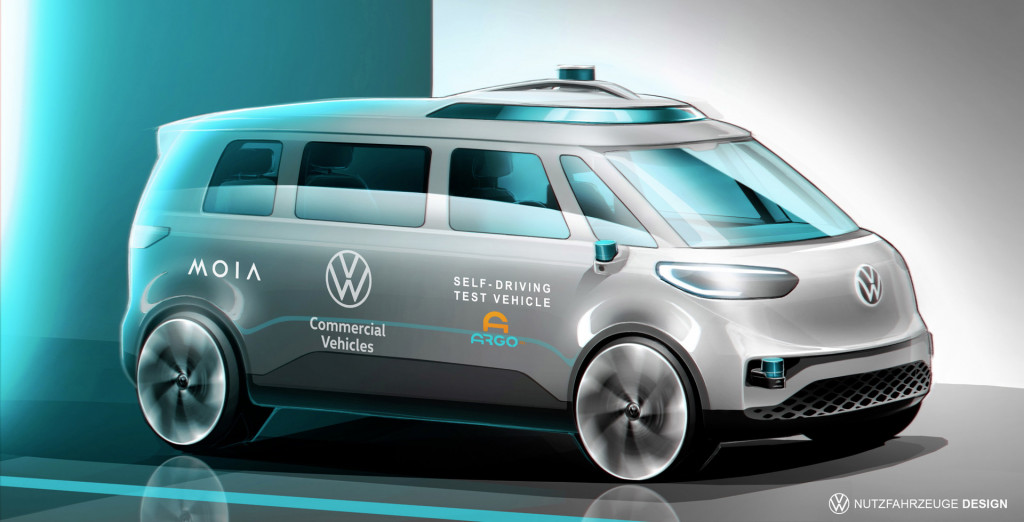Volkswagen Group on Tuesday announced the "New Auto" strategy that will guide the automaker through to the end of the decade.
It's a bold and somewhat risky plan, as it will see the automaker undergo further consolidation, with the goal being to move most of VW Group's vehicles to a single platform, battery cell, and software system.
The three main pillars that make up the strategy are software, electrification and autonomous driving.
In the area of software, VW Group is working to transform itself into a software-led company, and responsible for software development at the automaker is the new division Cariad. The division is working on a unified, scalable software platform and hardware architecture that will handle everything from infotainment to over-the-air updates to customer profiles and eventually self-driving capability. It's due to be rolled out in 2025.
VW Group sees a lot of potential in software for future revenue, especially with the introduction of self-driving capability, which VW Group predicts will be widely available by 2030. The automaker has hinted that cars in the future will have a self-driving mode that you can pay for at a certain rate, such as minutes or miles, similar to how you would pay a taxi driver. Cars are also likely to increasingly have software-based features that you can purchase on demand or subscribe to.
“By 2030, software—on the basis of automated driving—can become a major source of income in our industry”, Dirk Hilgenberg, CEO of Cariad, said in a statement.
VW Group expects to start benefiting from self-driving technology as soon as 2025, when the automaker will launch its first automated taxi service, at a location in Europe and shortly after in the United States as well. The service will rely on a self-driving version of Volkswagen's upcoming ID Buzz, using an SAE-scale Level 4 self-driving system developed by Argo AI, which VW Group owns together with Ford.

Volkswagen ID.Buzz AD self-driving car prototype
Separately, VW Group is developing its own self-driving system via Cariad for privately owned cars. This self-driving system, which is also expected to be rated at Level 4 on the SAE scale, will be available to all VW Group brands but timing is uncertain.
But self-driving capability is just one aspect of future mobility. That's why Cariad is also developing a mobility platform covering all different services from renting, subscriptions, to sharing and ride hailing. Yes, VW Group is coming for the likes of Uber and Lyft.
“Our upcoming mobility platform will integrate all mobility offerings from the group and our brands and thus maximize customer convenience,” Christian Dahlheim, VW Group's head of sales, said in a statement.
But what about actual cars? Here, too, VW Group plans a radical transformation. By the end of the decade, VW Group expects most of its fleet to be made up of electric vehicles—and most of these will be based on a single platform known as the SSP (Scalable Systems Platform). This platform will replace VW Group's current MQB, MSB and MLB platforms for internal-combustion vehicles and even the new MEB and upcoming PPE EV platforms.
The SSP will spawn its first model in 2026, expected to be a VW model currently referred to as Project Trinity. VW Group predicts that as many as 40 million vehicles will be built on the SSP during the platform's lifetime. The introduction of the platform is expected to result in significant cost savings and reduced complexity for the VW Group.
This standardized approach will extend beyond the platform, though. VW Group will also introduce a common battery cell design in 2023. The automaker's goal is to have approximately 80% of its EVs using a common cell design by 2030. The common cell is also expected to result in a 50% reduction in battery costs compared to current levels. The common cell, which VW Group is working with China's Gotion High-Tech to develop, will be used for volume models. For exclusive models, VW Group is looking at high-performance batteries including solid-state technology.
Finally, VW Group is intensifying its efforts to establish more charging locations for EVs. Specific targets for 2025 include, either directly or through partnerships, establishing 18,000 charging points in Europe, 17,000 in China and 10,000 in North America. In North America, VW Group is working with Electrify America to establish charging points.
